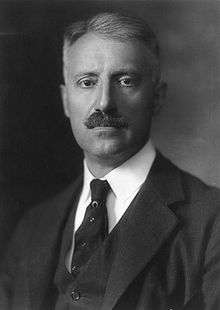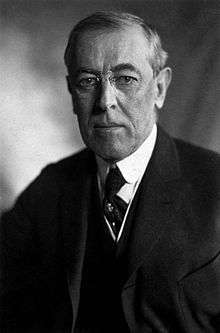Bainbridge Colby
| Bainbridge Colby | |
|---|---|
 | |
| 43rd United States Secretary of State | |
|
In office March 23, 1920 – March 4, 1921 | |
| President | Woodrow Wilson |
| Preceded by | Robert Lansing |
| Succeeded by | Charles Evans Hughes |
| Member of the New York State Assembly from the New York County, 29th district | |
|
In office January 1, 1902 – December 31, 1902 | |
| Preceded by | Hal Bell |
| Succeeded by | George B. Clark |
| Personal details | |
| Born |
December 22, 1869 St. Louis, Missouri, U.S. |
| Died |
April 11, 1950 (aged 80) Bemus Point, New York, U.S. |
| Political party | Republican until 1912 then National Progressive Party [1][2] |
| Alma mater |
Williams College Columbia Law School New York Law School[3] |
| Profession | Politician, Lawyer |
Bainbridge Colby (December 22, 1869 – April 11, 1950) was an American lawyer, a political progressive,[4] a co-founder of the United States Progressive Party and Woodrow Wilson's last Secretary of State. Colby was a Republican until he helped co-found the National Progressive Party in 1912; he ran for multiple offices as a member of that party, but always lost.[5]
Wilson's appointment of Colby was "bizarre" says historian John Milton Cooper, for Colby had no diplomatic experience or skills. Editorial responses from leading newspapers ranged "from puzzlement to outrage."[6] Colby was chosen because he was totally loyal to Wilson; he left no notable achievements in the office.
Life
Bainbridge Colby was born in St. Louis, Missouri on December 22, 1869. He graduated from Williams College (where he was admitted to Phi Beta Kappa),[7] then attended Columbia Law School and New York Law School (1892). He was admitted to the New York bar, and served as a member of the New York State Assembly (New York Co., 29th D.) in 1902. He spoke at the Colby College commencement on June 19, 1933, at which time he was awarded an honorary Doctor of Laws degree.[8]
Colby was married twice. His first wife was Nathalie Sedgwick, who became a novelist; they were married in 1895 and had three children (Katherine Sedgwick Colby, Nathalie Sedgwick Colby and Frances Bainbridge Colby). Colby decided to divorce his wife while he was in Paris in 1928.[9] The divorce was finalized in Reno, Nevada later that year.[10] The marriage apparently was very contentious and Colby felt the need to include in his divorce decree a monthly payment of $1,500.00 to stop Nathalie from "ridiculing him in her writings".[11]
Colby was known within his circle of friends and the press of the time as the "Dapper Gentleman". It did not take him very long to find true love once again, in the person of Anne Ahlstrand Ely of Bemus Point, in the western New York area of Lake Chautauqua. Ely was well known as a very gracious hostess as well as being very beautiful; she was very engaged in many of the same issues as Colby, such as women's suffrage. (It was Colby, as secretary of state, who issued the proclamation announcing that the 19th Amendment, guaranteeing women the right to vote, had been ratified as part of the U.S. Constitution.)[12]
Colby and Ely were married in 1929 and lived out their lives on the property known as "Little Brook Farm," located within the lakeside hamlet of Sunset Bay. Bainbridge Colby died in 1950 and his widow donated much memorabilia to the local library; it eventually found a home at the Library of Congress.[13] Anne Colby never remarried and continued to live on the farm until her death in 1963.[14]
Politics
At the New York state election, 1914, Colby ran on the Progressive ticket for U.S. Senator from New York, but was defeated by Republican James W. Wadsworth, Jr. At the New York state election, 1916, he ran again, this time on the Progressive and Independence League tickets, but was defeated by Republican William M. Calder.
During World War I, Colby was a member of the United States Shipping Board.
Colby was a special assistant to the United States Attorney General in an anti-trust action in 1917, and represented the U.S. at the Inter-Allied Conference at Paris the same year.
Secretary of State
Wilson appointed him Secretary of State on March 23, 1920, after firing his predecessor, Robert Lansing for insubordination. On August 26, eight days after ratification of the Nineteenth Amendment, Colby issued the official proclamation that it had become a part of the Constitution of the United States, guaranteeing women the right to vote.[15] In December 1920, Colby embarked on the battleship Florida for an official goodwill cruise to South America.[16] He served until Wilson left office on March 4, 1921. Colby advocated his policies firmly even as Wilson suffered the debilitating side effects of a series of strokes. Colby supported the League of Nations and established a precedent for not recognizing newly-Communist Russia; that would be reversed only in 1933.
Lawyers
After leaving office as secretary of state, Colby continued to practice law for the remainder of his career. As an attorney, Colby accepted Woodrow Wilson as a partner after the latter's presidency; Colby left that firm in 1923. Earlier in his career, Colby's most notable client was Mark Twain.
At the time of his death,[17] Colby was the last surviving member of the Wilson Cabinet.
References
- ↑ http://www.infoplease.com/encyclopedia/people/colby-bainbridge.html
- ↑ http://www.1911encyclopedia.org/Bainbridge_Colby
- ↑ The Miller Center for Public Affairs, University of Virginia
- ↑ https://books.google.co.uk/books?id=faqqVGdMbOoC&pg=PA153&dq=Bainbridge+Colby+progressive&hl=en&sa=X&ei=naZhVdjKHoGR7Aas2YKICg&ved=0CCAQ6AEwAA#v=onepage&q=Bainbridge%20Colby%20progressive&f=false
- ↑ http://www.1911encyclopedia.org/Bainbridge_Colby
- ↑ John Milton Cooper, Woodrow Wilson: A Biography (2009) p 556
- ↑ Politician members in Missouri, ‘’PoliticalGraveyard.com’’, accessed October 9, 2009
- ↑ http://www.hulahips.com/bainbridgecolbyspeechs/colbylawdegree
- ↑ http://www.time.com/time/magazine/article/0,9171,738003,00.html#ixzz2Ky4j3aYS
- ↑ http://freepages.genealogy.rootsweb.ancestry.com/~colby/colbyfam/b142.html
- ↑ http://www.time.com/time/magazine/article/0,9171,738003,00.html#ixzz2Ky4j3aYS
- ↑ http://www.history.com/this-day-in-history/19th-amendment-adopted
- ↑ http://freepages.genealogy.rootsweb.ancestry.com/~colby/colbyfam/b11.html#P19531
- ↑ http://freepages.genealogy.rootsweb.ancestry.com/~colby/colbyfam/b11.html#P19531
- ↑ The New York Times, August 26, 1920
- ↑ The New York Times, December 5, 1920
- ↑ Bainbridge Colby, State Secretary under Wilson, is dead at 80 years
Further reading
- Smith, Daniel Malloy. Aftermath of war;: Bainbridge Colby and Wilsonian diplomacy, 1920-1921 (Memoirs of the American Philosophical Society) (1970)
External links
| Wikisource has original works written by or about: Bainbridge Colby |
| New York Assembly | ||
|---|---|---|
| Preceded by Hal Bell |
New York State Assembly New York County, 29th District 1902 |
Succeeded by George B. Clark |
| Political offices | ||
| Preceded by Frank Polk |
U.S. Secretary of State Served under: Woodrow Wilson 1920 – 1921 |
Succeeded by Charles Evans Hughes |

